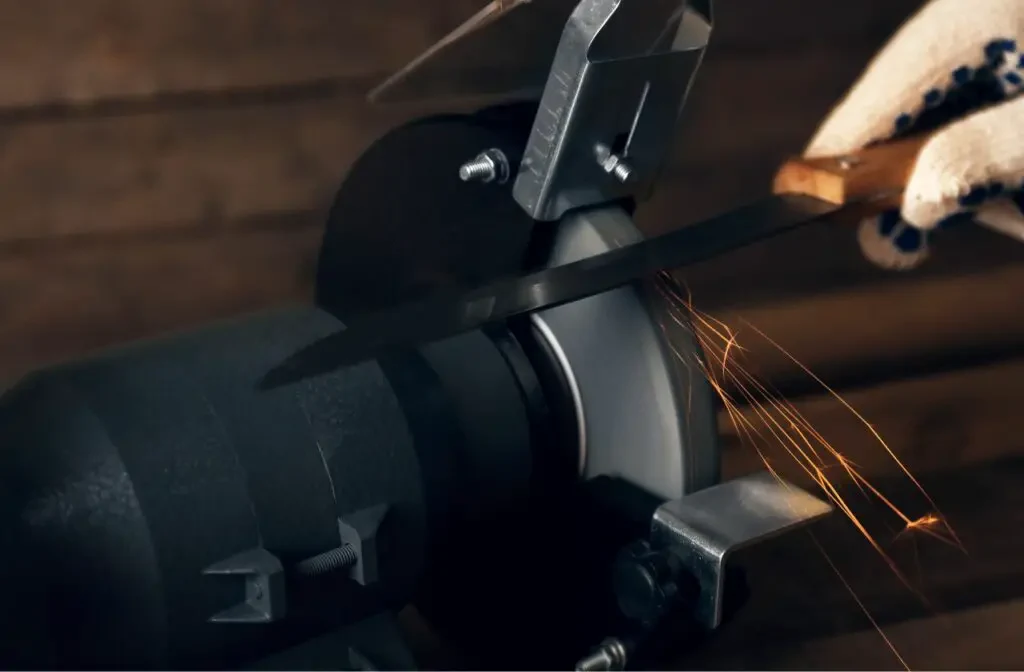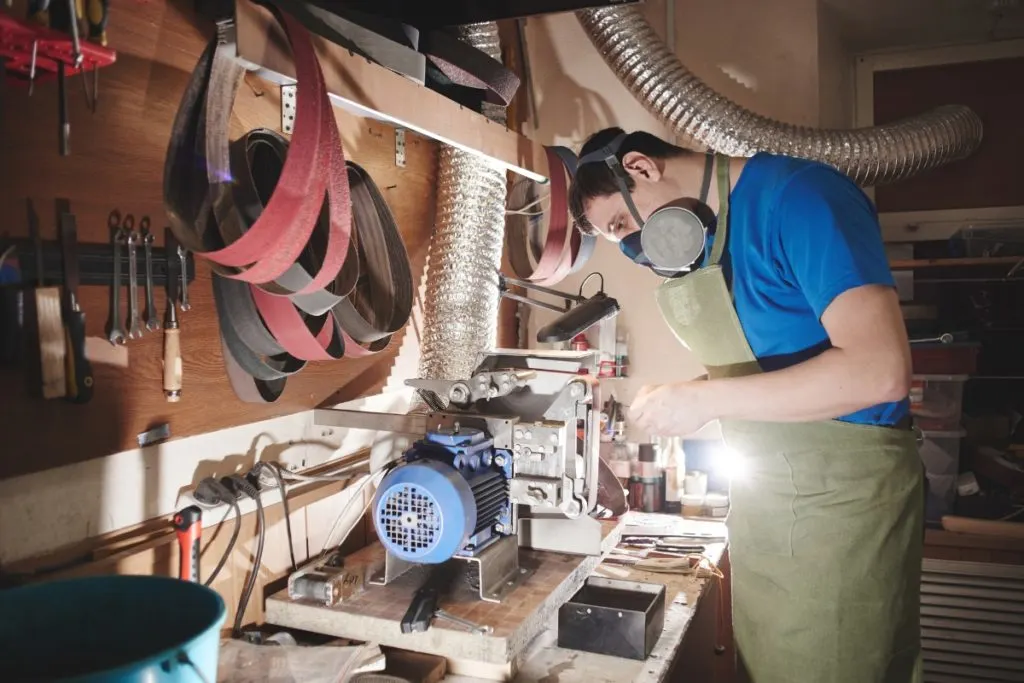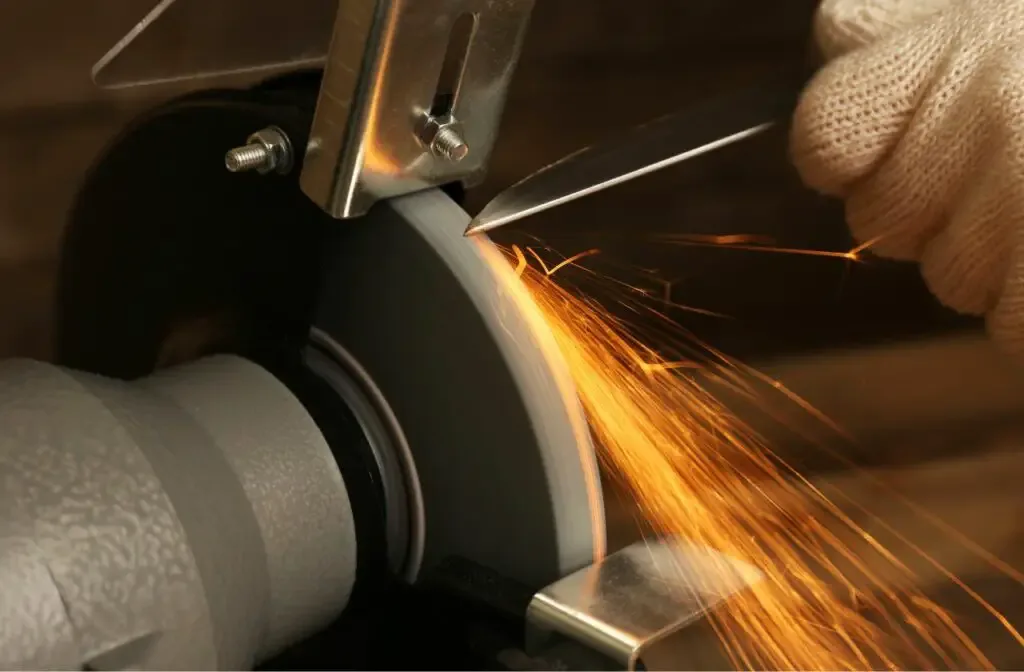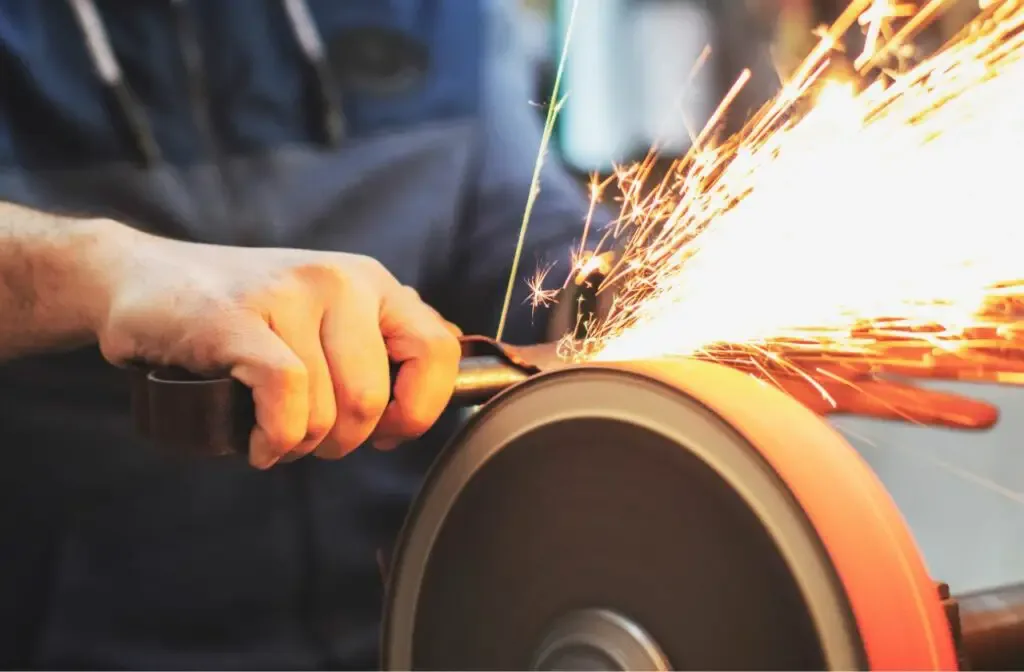As an Amazon Associate, we earn from qualifying purchases with no additional costs for you.
Sharpening knives is a skill that requires practice and experience to create the perfect edge on your knives. This is a daunting task for some knife owners, especially if they own high-end knives. Should you be considering getting your knives sharpened professionally rather than learning how to do it yourself?
Professional knife sharpening services are useful if you have expensive knives you don’t want to be ruined by incorrect sharpening. Use a professional sharpening service if you do not have the skills, tools, or time. Cheap knives are usually not worth sending to a professional for sharpening.
Professional knife sharpening services are available in most cities and offer to sharpen a wide array of knives, scissors, razors, and other edged tools. Should you use a sharpening service, how much can you expect to pay, and how often should you send your knives for sharpening?
If you are interested in checking out the kitchen knives that hold the best edge we recommend buying knives made by the Wüsthof company. You can find them by clicking here (Amazon link).

Why Is Paying For Professional Knife Sharpening A Good Idea?
For many knife owners, their knives are not just a tool, but we develop a relationship with our knives. We have our favorites and the ones we don’t like so much!
Part of using a knife correctly is understanding the geometry of the edge and how the knife is designed to work. Sharpening your own knives is a good way to learn more about the science behind the cutting edge of your knives and how to maintain your knives.
However, there may be some instances where paying for a professional sharpening service to sharpen your knives is a good idea, even if you generally sharpen your own knives.
Here are some reasons why paying for a professional knife sharpening service may be better than doing your own sharpening.
- You own expensive knives. If your knives are high-end, they are an investment as well as a useful kitchen tool. If you are an inexperienced knife sharpener, you could ruin your expensive knife trying to sharpen it.
- You have single-bevel knives. Single-bevel knives are very difficult to sharpen accurately, especially if they are Japanese single-bevel knives. The “flat” side of the knife is not completely flat but has a slight hollow grind, which is difficult to replicate on home sharpening equipment.
- The edge of the knife is damaged. Chips and gouges in the cutting edge of a knife can be difficult to repair and may require more sharpening expertise and equipment than you have available.
- You have too many knives. Knife collections can grow to large proportions, and if you have many knives, the sharpening task can become too much for you to do yourself. While most knives will not all become dull at once, sharpening 4 or 5 knives at a time can become a chore if you have to do it frequently.
- Convenience. Knife sharpening takes time, and some people are simply too busy to dedicate the time required to put a precision edge on their knives.
- You don’t have the right knife sharpening equipment. Good knife sharpening equipment is not cheap, and you don’t want to ruin a $500 knife on a $50 whetstone. If you do not want the financial investment of acquiring top-quality sharpening equipment to sharpen knives, a professional knife sharpening service is a good idea.
- Some knife edges are difficult to sharpen. Knives with serrated edges or recurved blades can be difficult to sharpen, especially with home sharpening tools. In these cases, a professional sharpening service would be the sensible choice.
- You have a free knife sharpening service. Many high-end knife manufacturers offer a free sharpening service on the knives they sell. If you have a free service available to have your knives sharpened professionally, why go to the effort of doing it yourself?
A distinction must be drawn between sharpening and honing. You should have the necessary skills and equipment to hone your knives yourself. This function is an integral part of knife use and maintenance.
Knives should be honed frequently to keep the edge in optimal condition, and it is not necessary to send your knives to a professional for this task. Sharpening is not performed as frequently as honing and should only be done when honing the edge no longer restores the sharpness or if the edge is damaged.
TIP: A sharp knife makes all the effort out of making the cut, but not all knives can hold a sharp edge and stay sharp for a long time. Check out knives that hold the best edge in the article below:
These 3 Kitchen Knives Hold the Best Edge (You Should Try)
What Is The Cost To Sharpen A Knife Professionally?

There are several pricing structures that professional knife sharpening services offer. Some offer deals on multiple knives, while others offer a subscription service where you pay a monthly fee, which will cover sharpening a fixed number of knives for a specific number of times each year.
The range of professional sharpening pricing gives you options to choose a service that best matches the number of knives you have and how often they need sharpening.
Some sharpening services charge a fixed rate per inch for the length of the knife. A common charge is $1 per inch, in which case an 8-inch chef’s knife will cost $8 to be professionally sharpened.
Other services charge a fixed price for knives under a certain length. One such sharpening service in my area charges $7 for any knife under 6 inches long and $9 for any knife over this length.
In most cases, the sharpening fee includes cleaning the knife and handle. Any repairs to the handle or any other part of the knife would incur additional fees.
The best way to establish the cost of professional knife sharpening in your area is to do an online search for local companies offering the service and compare their prices. Remember to check the user reviews on knife sharpening services since some companies are better than others.
Another cost factor to bear in mind would be the shipping costs to send your knives to the company and for them to package and send the knives back to you. If your knife sharpening service is local and offers a walk-in service, the cost of packaging and postage would be eliminated.
Is It Worth It To Have Cheap Knives Professionally Sharpened?
If you have some cheap knives in your collection, you may wonder if sending these knives to be professionally sharpened is worthwhile.
Sending cheap knives to be professionally sharpened will depend on how cheap the knives are and whether you use the knives frequently.
Some cheap knives are made from good steel and will benefit from professional sharpening, and they may become one of your favorite knives once they have a good edge. If you have a cheap knife that you enjoy using, it is probably made from decent steel, and it is worth sending to a professional for sharpening with your expensive knives.
If you have very cheap knives, they are probably not made from good steel and would not hold a good edge for very long. It is not worth sending knives like these to be professionally sharpened.
The best use for these knives is to view them as practice knives to enhance your sharpening skills and sharpen them yourself.
TIP: If you are interested in sharpening your knives by yourself, check out the best whetstones we recommend and personally use:
| Usage | Grit Type | Best Option |
|---|---|---|
| Fixing stone | 320 grit | Shapton Kuromaku 320 |
| Establishing the Edge | 400 grit | Naniwa Chosera 400 |
| Sharpening Stone | 600 grit | Naniwa Chosera 600 |
| Sharpening Stone | 800 grit | Naniwa Chosera 800 |
| Finishing Stone | 1000 grit | Suehiro CERAX |
| Polishing Stone | 2000 grit | Shapton Kuromaku 2000 |
| Polishing Stone | 5000 grit | Shapton Kuromaku 5000 |
| Extra Polishing Stone | 8000 grit | Shapton Kuromaku 8000 |
| Mirror Polishing Stone | 12000 grit | Shapton Kuromaku 12000 |
TIP: Understanding whetstone grit levels can be a little confusing at first. Our guide to whetstone grits and their levels will help clear up misconceptions and guide you to the best stones for your requirements.
Complete GUIDE About Whetstone Grit: Levels & What To Buy
How Long Does It Take To Sharpen A Knife Professionally?

The time it takes to have a knife sharpened professionally will depend on the damage to the knife’s edge. Professional knife sharpeners have the right tools and skills to speed up the job and sharpen the knives more accurately.
A standard sharpening on a knife can take anywhere from 5 to 10 minutes. If extensive repairs to the edge are required, the repair and sharpening process can take from 30 to 40 minutes.
When establishing how long it takes to get your knives professionally sharpened, remember to consider the time the knives will spend in transit to and from the service company.
How Often Should I Professionally Sharpen My Knives

The frequency with which you should get your knives professionally sharpened will depend on how well-used your knives are.
Using your knives daily will require more frequent sharpening than knives used once a week. If you use your knives frequently, they may need to be sharpened every three months if you hone the edges regularly to minimize sharpening.
Sharpening the knives professionally every six to twelve months is generally sufficient for moderate or infrequent use.
TIP: Most people own multiple types of knives, each with different sharpening requirements. Find out the answer on how frequently you should sharpen each different kind of knife in the article below:
How Often To Sharpen A Knife? (Answers For All Knife Types)
Preserving the Sharpness of Your Knives After Sharpening

After investing in professional knife sharpening, it’s essential to maintain the sharpness of your knives to extend the time between sharpening sessions.
Proper care and maintenance not only preserve the edge but also ensure your knives are always ready for use. Here are some valuable tips to help you maintain your knives’ sharpness:
Regular Honing
Use a Honing Rod: Regularly use a honing rod to realign the edge of your knife. This doesn’t sharpen the blade but keeps the edge straight, ensuring optimal performance. Honing before each use is ideal, but doing it weekly can significantly maintain the edge.
Correct Technique: Hold the honing rod vertically and swipe the knife down and across the rod, maintaining a consistent angle (usually 15-20 degrees) on both sides of the blade.
Proper Cutting Surfaces
Use Appropriate Cutting Boards: Cutting on hard surfaces like glass, metal, or stone can dull your knife quickly. Opt for wooden or plastic cutting boards, which are gentler on the blades.
Avoid Misuse: Refrain from using your kitchen knives for non-food-related tasks. Using them to open packages or cut through hard materials can damage the edge.
Careful Cleaning and Storage
Hand Wash Your Knives: Instead of using a dishwasher, hand wash your knives with mild detergent and warm water. Dishwashers can cause knives to bump against other items, dulling the edge.
Dry Immediately: After washing, dry your knives immediately to prevent rust and corrosion.
Proper Storage: Store knives in a knife block, magnetic strip, or sheath. Avoid tossing them in a drawer where they can get jostled and dulled.
Mindful Usage
Use the Right Knife for the Task: Different knives are designed for specific tasks. Using the correct knife reduces wear and tear on the blade.
Avoid Bone and Frozen Foods: Cutting through bone, frozen foods, or other hard items can chip or dull the blade. Use a cleaver or a saw for these tasks.
Periodic Inspection
Check for Dullness: Regularly inspect your knives for signs of dullness. If the knife struggles to cut through soft foods or slips off the surface, it may need honing or professional sharpening.
Look for Damages: Small chips or bends in the blade can affect performance. If you notice any, consider having the knife professionally serviced.
Learning Basic Sharpening Skills
Invest in a Whetstone: For those interested, learning to use a whetstone for basic sharpening can be beneficial. This skill allows you to maintain the edge between professional sharpening sessions.
Seek Guidance: Consider attending a knife sharpening workshop or watching instructional videos to learn the correct technique.
By following these maintenance tips, you can significantly prolong the life of your knives’ sharpness, ensuring they remain efficient and reliable in your culinary endeavors. Remember, a well-maintained knife is not only a pleasure to use but also a safer tool in your kitchen.
Conclusion
Professional knife sharpening services are generally worth the cost if you have expensive knives or a lot of knives that need regular sharpening. They are also the better option if you do not have the skills yet or the available time and equipment to sharpen the knives yourself.
Knife sharpening is an excellent skill to learn, so you can put a good edge on your knives when you don’t have the option of a professional knife sharpening service or if you would like to do it yourself. Remember to use your cheap knives to practice sharpening before you try sharpening an expensive knife!
TIP: Self-sharpening knives are a great alternative if you don’t have time to sharpen your knives regularly. Find out more about the unique concept of self-sharpening knives in the article below:
Self-Sharpening Knives: All You Need To Know About Them
